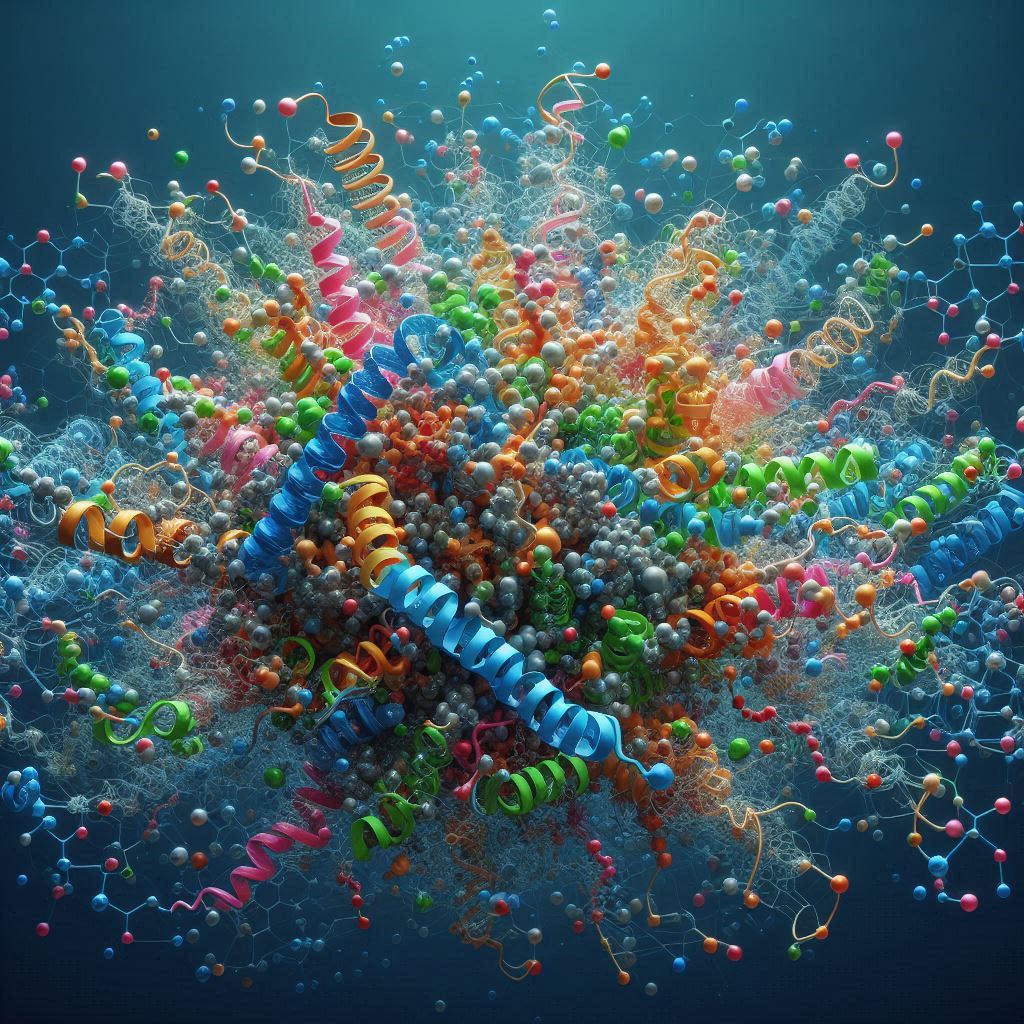
Dr. Marco V. Benavides Sánchez.
In the realm of biological sciences, a quiet revolution is underway, driven not by traditional laboratory techniques but by the computational prowess of artificial intelligence (AI). At the forefront of this revolution stands AlphaFold, an AI system developed by DeepMind, a subsidiary of Google. AlphaFold has garnered attention for its remarkable ability to predict the 3D structures of proteins from their amino acid sequences with unprecedented accuracy. This technological breakthrough is poised to reshape our understanding of biology and revolutionize fields from medicine to agriculture.
AlphaFold: A Game-Changer in Protein Structure Prediction
1. The Birth of AlphaFold:
AlphaFold represents the culmination of years of research in AI and deep learning. Released by DeepMind, AlphaFold employs advanced neural network architectures to decipher the intricate folding patterns that dictate protein structure. Proteins, fundamental to life, perform a myriad of functions in cells, from catalyzing biochemical reactions to providing structural support. Understanding their 3D structures is crucial because structure determines function.
2. Accurate Predictions on a Massive Scale:
Since its debut, AlphaFold has made significant strides. It has successfully predicted the structures of over 200 million proteins from a vast array of species, encompassing nearly every known protein sequence in existence. This comprehensive database, freely accessible to researchers worldwide, marks a pivotal advancement in biological research. Scientists can now explore the structural blueprints of proteins with unprecedented ease and depth, opening doors to new discoveries and applications. I don’t know about you, but to me that’s astonishing.
3. Implications for Drug Discovery:
One of the most promising applications of AlphaFold lies in drug discovery. Many diseases are rooted in malfunctioning proteins, making them prime targets for therapeutic intervention. By accurately predicting protein structures, AlphaFold accelerates the process of identifying potential drug targets. Researchers can now design molecules that interact precisely with target proteins, potentially leading to more effective treatments for conditions ranging from cancer to neurodegenerative diseases.
AlphaFold’s Impact Beyond Medicine
1. Biotechnological Innovations:
Beyond medicine, AlphaFold’s impact extends into biotechnology and agriculture. Proteins are not only crucial in human biology but also play pivotal roles in industrial processes and agricultural productivity. AI-driven predictions of protein structures can optimize enzyme design for industrial processes, enhance crop yields through improved plant breeding techniques, and even aid in developing sustainable biofuels.
2. Environmental and Ecological Applications:
Understanding protein structures also unlocks insights into ecological systems and environmental resilience. Proteins govern a vast array of biological functions in organisms across ecosystems. By deciphering these structures, scientists can better understand how organisms interact with their environments, predict responses to environmental changes, and devise strategies for conservation and ecological restoration.
The Promise of Generative AI in Protein Engineering
1. Next Frontier: Designing New Proteins:
Building on AlphaFold’s success, researchers are now exploring generative AI tools for protein engineering. These tools, such as FrameDiff, aim not only to predict existing protein structures but also to design entirely new proteins with tailored functions. This capability holds immense potential for developing novel biotechnologies, creating bespoke enzymes for industrial applications, and advancing personalized medicine through custom-designed therapeutic proteins.
2. Ethical and Societal Implications:
As with any transformative technology, the rise of AI in protein structure prediction raises ethical considerations. Questions about data privacy, accessibility of AI-generated knowledge, and the potential for misuse must be addressed proactively. However, the democratization of knowledge facilitated by platforms like AlphaFold’s open-access database represents a step towards collaborative and transparent scientific inquiry.
The Future Landscape of Digital Biology
1. Paving the Way for Digital Biology:
AI-driven protein structure prediction heralds the dawn of a new era in digital biology. With powerful computational tools at their disposal, researchers can now explore the “protein universe” in unprecedented detail. This exploration promises breakthroughs in fundamental biological understanding, disease mechanisms, and therapeutic innovations that were once unimaginable.
2. Collaboration and Innovation:
The accessibility of AlphaFold’s predictions fosters collaboration across disciplines and continents. Researchers from diverse backgrounds can leverage AI-generated insights to advance their own investigations, catalyzing cross-pollination of ideas and accelerating scientific progress. This collaborative spirit is essential as we tackle complex global challenges, from emerging infectious diseases to climate change.
Conclusion
It can’t be stressed enough that AlphaFold’s ability to predict protein structures with such remarkable accuracy represents a seismic shift in biological sciences. By harnessing the power of AI, researchers have unlocked nature’s blueprints, paving the way for transformative discoveries and innovations across multiple domains. From personalized medicine to sustainable agriculture, the implications of AI-driven protein structure prediction are profound and far-reaching. As we navigate this brave new world of digital biology, one thing is clear: the future holds endless possibilities for those willing to explore the frontiers of AI and biotechnology.
For further reading
(1) ‘The entire protein universe’: AI predicts shape of nearly every known protein – Nature.
(2) Artificial Intelligence Predicts The Structure of Almost Every Protein Ever Found
(3) How AlphaFold can realize AI’s full potential in structural biology.
(4) AlphaFold – Google DeepMind.
(5) Google’s DeepMind AI Predicts 3D Structure of Nearly Every Protein Known to Science.
#Emedmultilingua #Tecnomednews #Medmultilingua

Leave a Reply